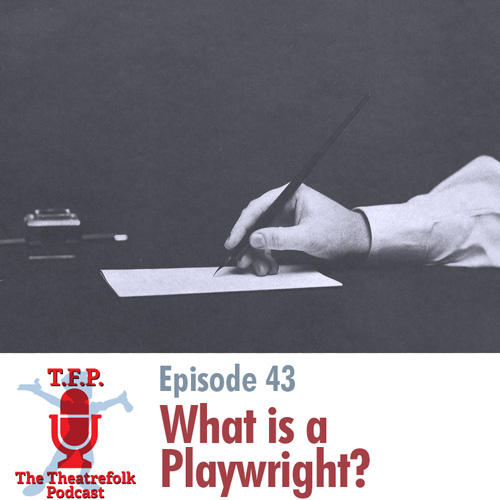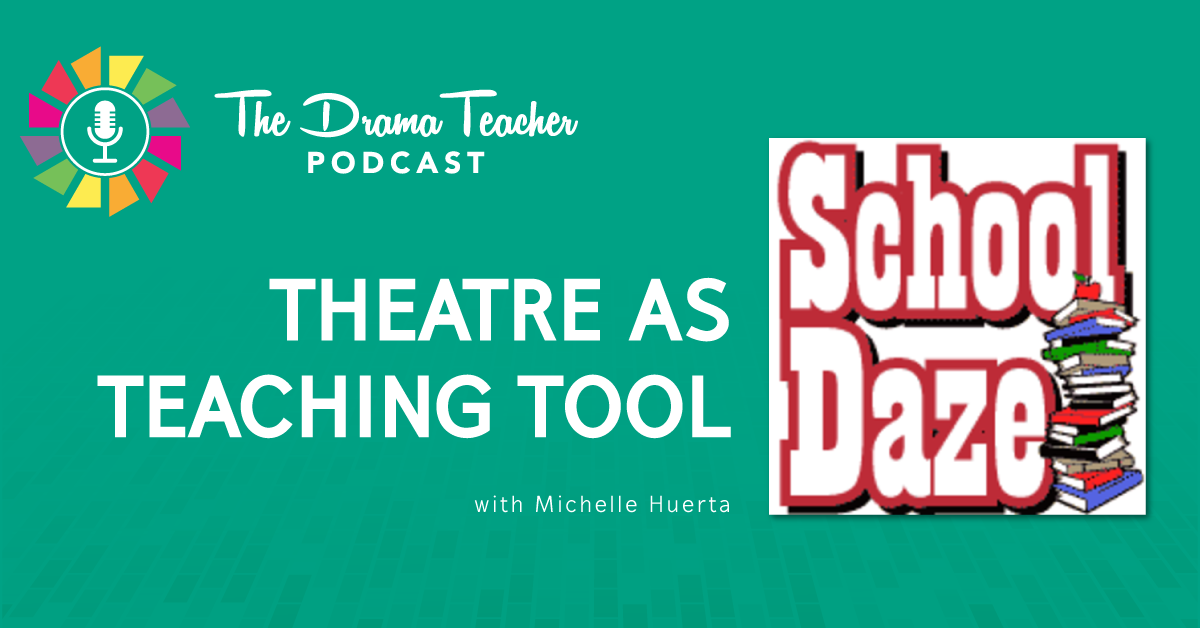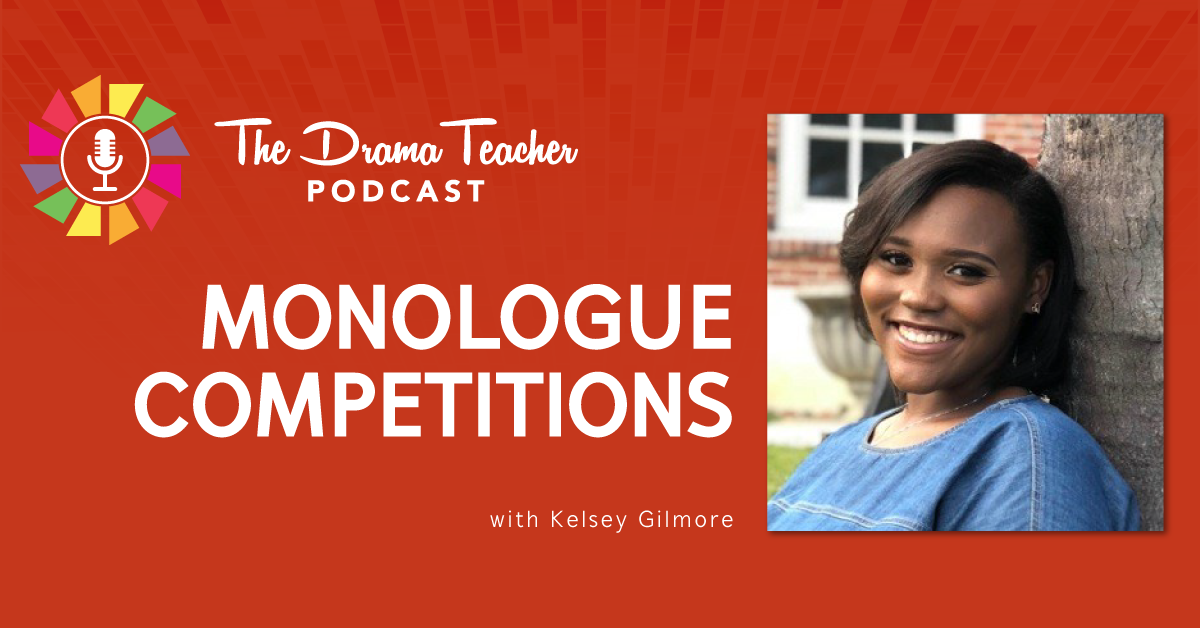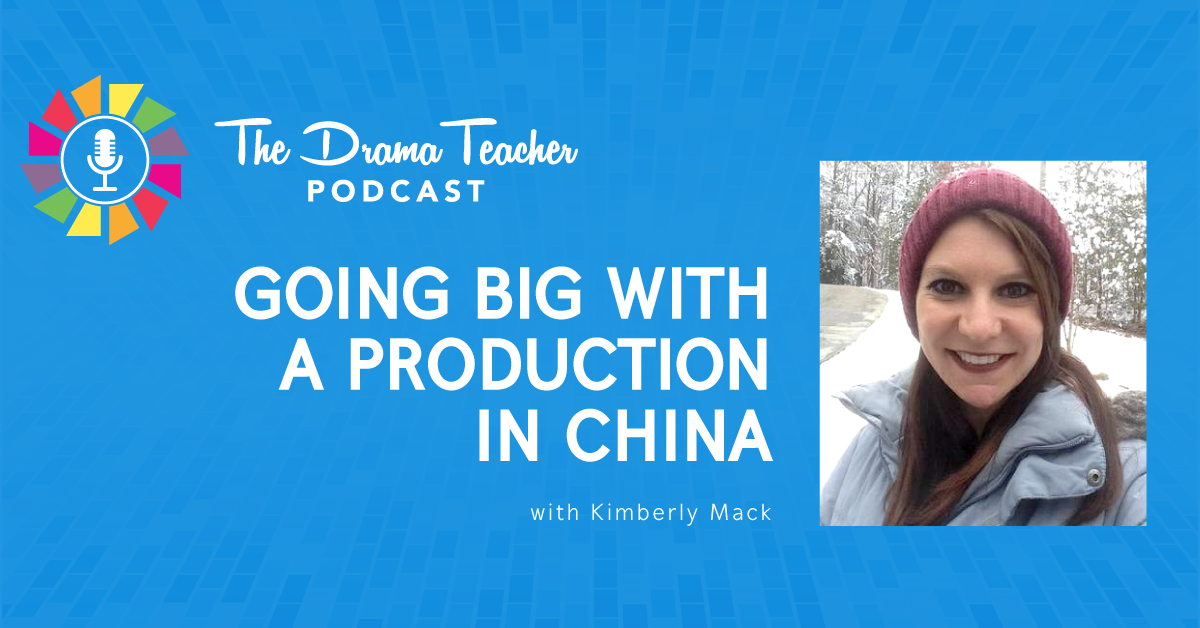What is a Playwright?
Episode 43: What is a Playwright?
What is a playwright? Lindsay talks about what that question means to her and what happens when she assumes everyone is aware of that meaning. Guess what? Everyone is not aware.
Show Notes
- Playwrights! Send us your plays! Our submission guidelines are posted here.
Subscribe to The Theatrefolk Podcast
Episode Transcript
Welcome to TFP, the Theatrefolk podcast. I am Lindsay Price, resident playwright for Theatrefolk. Hello, I hope you’re well. Thanks for listening.
Today we’ll be talking a question that I know the answer to but why should anyone else? But first, let’s do some THEATREFOLK NEWS: how do you submit a play to Theatrefolk? Sometimes I get asked if I’m the only playwright at Theatrefolk, and I am not. No, no! We feature the plays of 24 other writers at present and we’re always looking for more. Some of our writers are professional playwrights. Some are teachers who also write which amazes me because that’s like two full time jobs right there. We have an open submission policy which means anyone can submit a play to us, so long as it fits the guidelines. The first being the play has to work for schools and student performers. That’s a big one, we can tell pretty quickly if a writer has submitted something they know will work for us and our customers or whether they’re just sending stuff out blind. Hey, if I throw this into the wind maybe someone will take it.
And frankly if you don’t care where the home for your play is, why should we? And for heaven’s sake, please do a proper cover letter even in an email. Tell us who you are, why are you sending this play to us. Again, take care about that little baby play of yours to make sure it is going to find a good home that is going to actually get out to an audience and be produced, right? That’s our final goal. We want this stuff to be produced. So, having a good resting place for it is important.
For modern plays, we are looking for a majority of teen aged characters and most definitely a teen protagonist. I get writers who argue with me all the time that “Oh, that’s not good for high schools. Teens can play all ages and we shouldn’t be narrowing their prospects” and sure, fair enough, that’s… You’re absolutely right that teens can play a variety of characters. It’s just not our mission or our mandate that we’re looking for. That’s not our focus. We want teen stories, teen perspective. Large cast is good, more girls than guys is good. Simple set is good. We love adaptations. But before sending one, look at our catalogue and see what we’ve got. We are a small and mighty and we don’t want to double book with something similar than what we already have.
Here’s an important guideline. We are not so worried about whether or not the play has had a professional production because our plays, our customer, our schools and students. They don’t often get produced by professional companies. What we care about is that it works in a school. We love it when we get plays that have been produced to the Thespian festival or a series festival. Or that they’ve just been put on at the school because that means that whoever wrote them, most often it’s a teacher, they have thought about what’s going to work for them. And what’s going to work for them more often than not it’s going to work for us and it’s going to work for others.
And finally, email your play to us. Don’t spend your precious time and your precious money putting something in the mail. That is old school; we are interested in getting it by email. And you can email it to us at help@theatrefolk.com. Put it to my attention, Lindsay Price. I am the first reader on all submissions that come in. Put my name on it, it makes me feel good.
Lastly, where oh where can you find this podcast? We post new episodes every Wednesday at theatrefolk.com and our Facebook page and Twitter. You can find us on the stitcher app, AND you can subscribe to TFP on iTunes. Imagine that? All you have to do is search on the word Theatrefolk.
Episode Forty-Three: What is a playwright?
What is a playwright? I was a little shocked when I asked this question in a high school classroom recently and got a lot of blank stares and a couple of I don’t knows and achingly long pause before the connection was made between plays, and play that writes. Now I have to say, I was much less shocked when I asked the next question “Is playwriting a job?” and “Can playwrights make a living?” The response was pretty much what I expected. No, they didn’t think that playwriting was a job, just a hobby. It starts so young folks that disconnect that people in arts have a job, that the arts are a job. They just think there’s no way that that could possibly make sense. How could the arts be a job? Like a doctor or a dentist or a teacher; no, not teachers. Teachers have their own boat load of problems.
But the bottom line is that artists deserve to be paid for their work and that absolutely we could make a living out of our work. When people don’t think of artists as a worker or are equally real job, it really does become much easier for students, directors and teachers to change our work. It boggles my mind how easily some people think it is okay to just “No, no, take something out. Oh I’m going to change these words around.” and not even ask if it’s okay. Oh, you don’t mind, do you mind? Do I go into your job and change your work? Oh come on, you’re an artist. You’re not real. This isn’t real. You write for the love of it, don’t you? This is the point where I, metaphorically and literally, sitting here raising my fist but you can imagine it in your head.
Raise my fists, both fists, shake my fists to the sky and say “How dare you? I am real! I have a job!” Being an artist is real a job. It’s a job and it should be considered a job and respected like a job. But let’s table that for a mo and go back to the first question.
What is a playwright? I asked this question in a workshop because I had, before that, been in a different workshop, in a different classroom where I all of a sudden was getting the distinct and very unsettling feeling that these students were not connecting because they didn’t get what I do. They didn’t get the connection between me standing in front of them, doing the old dog and pony show and what a playwright does. They didn’t get, and this is the big one, they didn’t get the connection between me, human being, and the play. And that I might have worked on the play. And I might have spent a lot time working on the play and they didn’t get that writing is work or that writing was my job. You know that whole job thing? Well they didn’t get it. There was no connection between playwright, play, work, and job. And I have to say the subsequent class didn’t get it either.
But to play my own devil’s advocate because I am the only one here, who else is going to do it? It’s just me talking into the phone box. So, what’s the name of the devil cheeky Damn Yankees Lola, whatever Lola wants, Lola gets…I think so, something like that. Anyway to take the other side, to take Lola’s side, why should they know? Why should teenagers know the answer to the question, what is a playwright? Why should they know? And let get’s real, oh my God.
Sometimes things come out my mouth faster than I think about them or they sound good in my head and they don’t come up so good. But it is real; it’s like let’s make this real. Why should they care? In their lives whether or not what makes a playwright and whether or not they should treat playwriting as a real job, that’s not in their frame of reference. Why should they know that playwriting is a job? Just because I am so wrapped up in living my little life, living my little artist life, raising my fists to the sky; respect me! Respect my job!
Why should I make that assumption that everyone, every teenager is acutely aware of me and what I do and my little shaky fists. I think they should but that’s because I’m a vain egotistical monster, oh let’s try that one again. I’m a vain egotistical monster. And I think that everyone should know what I do and that everyone should love what I do. Love me, love my work. It’s all of being loved best. So maybe I’m not a monster, obviously I’m not a monster. I don’t have fur. I cannot lie. I cannot tell a lie over this. I was more than a little ticked off at the idea of students not knowing the connection between play and playwright. And not knowing or caring at what I do is a job and that I work fully hard at it.
My ego came out to stamp around the sandbox. These students are in a drama classroom. It’s ludicrous they don’t know what a playwright is! (Stamp, stamp, stamp) That’s me, that’s metaphor me stamping around the sandbox and pouting. Absolutely, stamping and pouting. Everyone should know what a playwright is, what a playwright does. It should be drilled into them. It should be common knowledge. (Stamp, stamp, stamp, pout, pout, pout)
And again, Lola’s going to come out. Lola’s got to ask… Oh I can’t do that. I can’t talk as the third person. I have to ask. Why should they? Why should they know? What am I to them? They’re not studying me and what I do, right? I just happen to be a life playwright standing in front of them and we just happen to be work-shopping a play that I have written. Why should they make that connection? In class, hopefully, they are studying some plays, right? They’re looking at words in a book. In some cases, those words have been there for 50 years, 60 years, a hundred of years, hundreds and hundreds of years.
They don’t have a concept about the process that may have occurred to put those words on the page. They’re not seeing chicken scratches, balled up pieces of paper. They’re not seeing changes. They’re just seeing typed, neat, well-formatted words in a completed book. And if they do look at a playwright, they’re probably looking at the lives of the playwright. They’re not studying process. They’re looking at where Shakespeare was born. How many plays did he write? Where did he die? Who the playwright is, not what the playwright does.
I know, I can’t think. I may be way off-based but I really can’t think of any class that would really get into what is Shakespeare process. Well, how could you? How can anyone study how Shakespeare used to write his plays? Well I think that might be important, as a playwright. I might be shaking my fist. Where does it have a place in a standard high school curriculum? The analysis of a play is about the finished product. It’s about the play. It’s not about the process. You study product. It makes a lot of sense. Even if it hurts my fragile little artist ego even if I don’t want to admit, it makes sense that the connection between the effort a playwright and what that effort might have been, the magnitude of that effort into a play, that connection between playwright and play is lost. It makes sense that studying a play doesn’t give a student enough information to make the connection playwright equals real job.
And here’s what it really boils down to I think. At the high school level, so many students find writing beyond them. That it is beyond their capacity and if they could… they could never do it, they could never manage it. Well how could it ever be done? How could it ever be done at the “make a living level”? Now, why they don’t make this same connection with brain surgery I don’t know. “Oh I can’t be a brain surgeon in high school, well that’s impossible!” No one could ever be a brain surgeon. It is an impossible job. Who could ever make a living as a brain surgeon? Nobody does that. They say “Oh I can’t do it now but I can go to school and I could learn.” Maybe the connection has not made with playwriting because of the stereotype of what it means to be a writer and that it’s already in someone that it’s just… You got to be talented and that’s it. It is not something that you could learn. So you could learn to go be a brain surgeon but there’s “How could you learn to be a playwright?”
And here’s another thing. Jobs, those real job things, have set rules and parameters. What a job is has been set for at least a hundred years, Right? An accountant gets up in the morning, has breakfast, leaves the house, goes to an office, and does numbers all day. I don’t know what an accountant does. I have no idea what an accountant does, therefore it cannot be real! (Stamp, stamp, stamp, pout, pout, pout) And then at five o’clock, the accountant turns off his or her computer, locks up the office and goes home. There is a beginning and an end to the day and then at the end of the week, there is a defined paycheck, right?
There are very clear steps to this job world. It’s really one of the reasons I don’t work in the real world because it drives me crazy. But it’s really hard to compare that kind of job that falls within the parameters of what everybody thinks a job is and compare it to what I do. How could you? To the outside world, I’m at home eating bon-bons in my pajamas all day. It’s not real. I am positive I have family members who have no clue about what I really do or who think I don’t have a real job for this exact reason – it’s out of the parameter so it doesn’t compare. I’m sure they have no idea how I make money and that’s another thing.
A lot of people have no idea how playwrights make money. There is no defined paycheck at the end of the week. They don’t know what royalties are. I’ve had conversations where I’m amazed when people are genuinely surprised that they have no idea that if a company is going to put on a play then they have to pay royalties for that play. Many people have no idea about that process. They don’t know that schools and companies have to pay to put on a play. And again, Lola says, why would they?
The people who know are the people who do it, and still those people who know they’re supposed to pay royalties and who know they’re supposed to buy books or pay to photocopy the play. Some of those people still ignore that part of the process because I think they think that artists aren’t real. That’s not a real job, why bother paying them? Can you imagine if you tried to get your teeth fixed and then decided in your head that you weren’t going to pay the dentist? No, you can’t because there are rules to what being a dentist is. And being a dentist is one of those real jobs.
So this whole arena of questions, what is a playwright, what does a playwright do, can a playwright make a living, it really has given me pause recently. And really made me go… the ego, stamping and pouting around the sandbox, you need to sit down. Now I’m talking to an ego. This is all about me. Being a little ego-driven and what, how people should perceive me as a playwright. And what’s happening is I think I am not setting up the world. I’m not setting up the world of the playwright properly when I go into schools. I don’t do enough to make what I do seem like a real job. And the responsibility in whether or not students know what I’m up to lies in me and not in them.
It is a poor assumption on my part to think that they and actually, everybody automatically knows what I do, how I do it and how it applies in the real world. I need to take more care. I need to clarify not in stamping around the sandbox, pouting, shaking my fists kind of way but in a making a connection. I think students can make connections really quickly. And think that they just need to know what the score is. They need to know the situation. They need to know the parameters of the world. And once they know, they jump in like nobody’s business. And it’s not enough to say that a playwright is someone who writes plays because even that is intangible.
There has to be a tangible connection between here is a real job and the steps that make it real and here is what writing is and here are the steps that make it real. And it is real as that job over there. It’s different. It has different rules, rules that don’t… I mean, I don’t have to leave the house which is the most awesome-st rule of all, but it’s a job. And if I can do that, if I can stuff my ego in a box and really focus on what this always should be about and that’s connection whether it’s my place in an audience or me and students. If I can find that connection, one classroom at a time, one student at a time, then somewhere down the line that one student will pass on their connection on to another student. And they’ll pass it on to another student and so on and so on and so on. And if you know what commercial that’s from, then you my friend are old. But then I made the connection first so that means I’m old too.
And that’s where we’re going to end. Take care my friends, take care.
Music credit: “Ave” by Alex (feat. Morusque) is licensed under a Creative Commons license.



